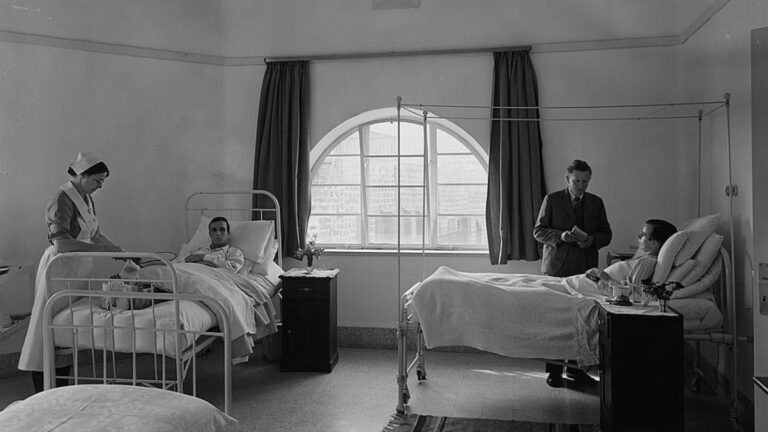When Guy Levy opened his new business a year ago, he didn’t describe it as a restaurant, vintage furniture store or live music venue. Rather, he named it Ivri – House for Hebrew Nostalgia.
A wise idea, given that the Ivri project has many facets, just like its creator.
A graduate of Shenkar College of Engineering and Design in interior design, Levy’s forte is renovating period buildings to their former glory and furnishing the apartments in vintage style.
It was through one such project, a restoration of an Eclectic-style building from the 1920s, that he amassed a surplus of Israeli memorabilia and secondhand furniture.
At the same time, a large empty space stood for rent next to his interior design studio, which is located on a street in south Tel Aviv that is slowly gentrifying.
“For three years we looked at each other every morning and finally I gave in and decided to start the Ivri project,” he says with a touch of humor. (Ivri means “Hebrew.”)
Levy, 41, saw himself “following in the Israeli pioneer spirit, which believes in going ahead and doing, then learning along the way.”
What is Hebrew culture?
The son of a Russian immigrant who came to Israel as a 20-year-old in 1971 and a Sabra father from a Persian family, Levy’s first step was to “dig deep” into the concept of what Hebrew culture means and what is special about it.
“I realized that while not much is original, other than we created the cherry tomato and p’titim (Israeli couscous), it’s the combination of many cultures that gives it its character. So my definition of Ivri is collectiveness, a kibbutz galuyot [ingathering of the exiles]. I decided to go with this spirit in music, food and design.”
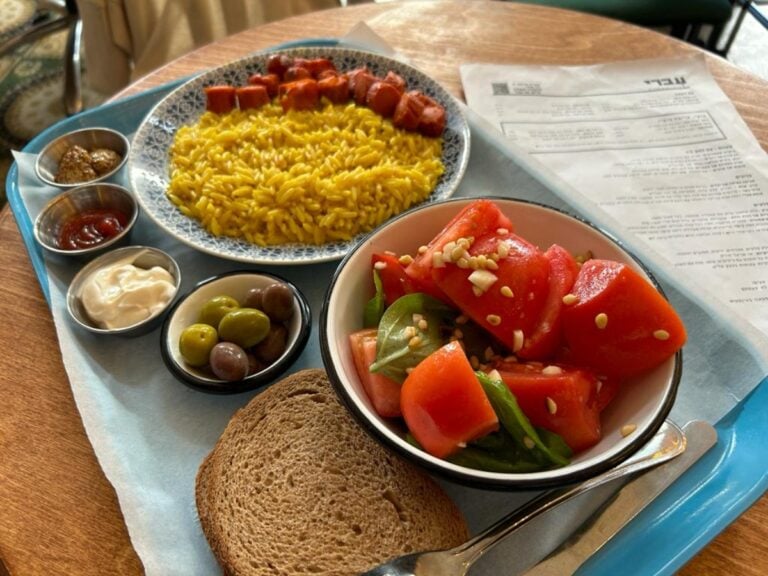
A common reaction when customers enter, he tells ISRAEL21c, is immediately recognizing an object from their past.
“They are usually excited when they see a crocheted tablecloth exactly like the one they remember from their grandma’s home or recognizing the small brown radio they had as a child.”
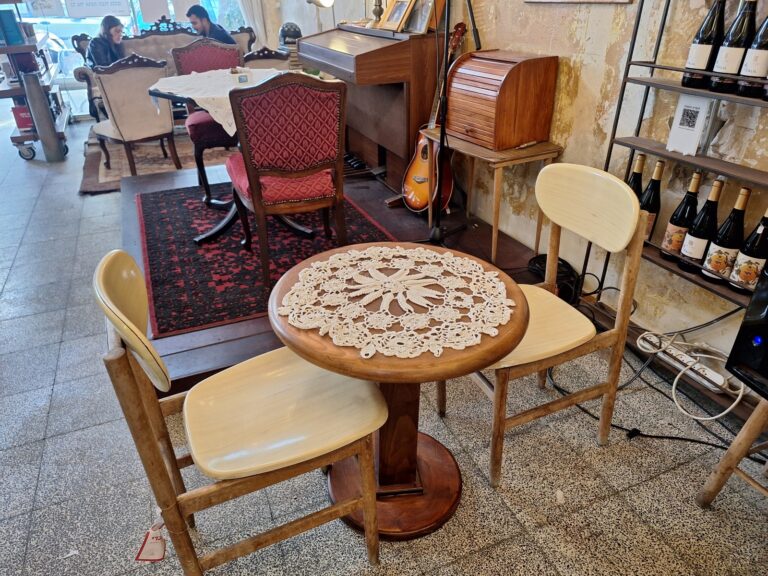
Levy is adamant that all items on display have only Hebrew labels (a tough call these days where English is the lingua franca).
He takes a bottle of Galilee Mountain wine off a shelf and points to the label with its Hebrew lettering and scene of early kibbutz pioneers, adding that this was a real find as the wine is excellent and most packaging in Israel doesn’t fit with his Hebrew-only requirement.
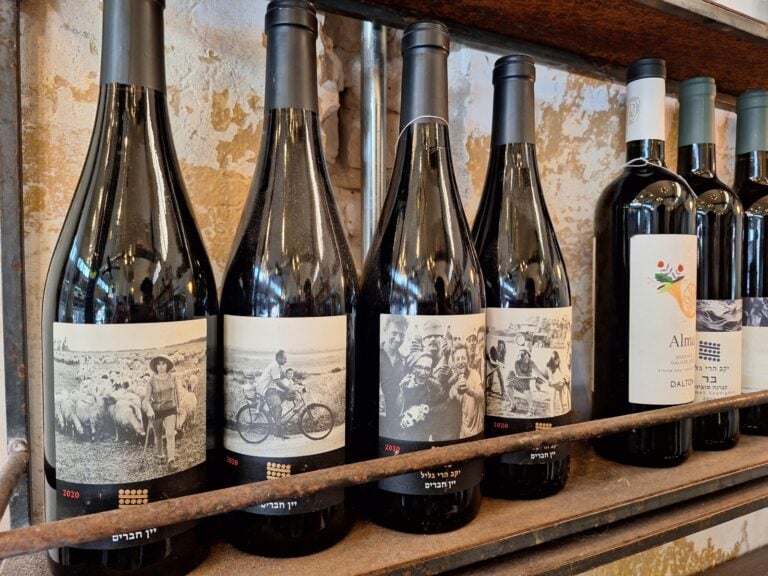
The staff at Ivri also dress the part. They are all wearing khaki shirts like those worn in the Scouting movement.
“It started as a joke that as we are on Gedud HaIvri Street,” a reference to the Jewish Legion made up of Jewish volunteers to the British Army during World War I, “we would wear a uniform and protect our street.”
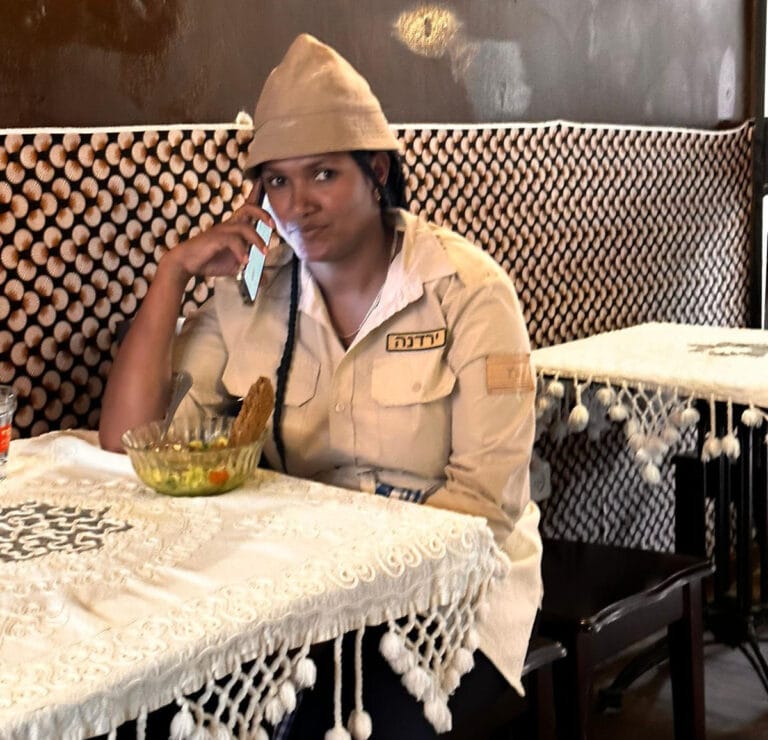
The next stage will be adding a kova tembel (a hat which became a national symbol and was mostly worn by the early kibbutz pioneers) and developing a line of merchandise.
Finding fun in memorabilia
Levy is full of fun as he pulls out a dial-up phone and gives me a landline number to call. It immediately rings and brings up a sound from yesteryear.
The menu is also humorous. On top of the paper menu it says “A Paper Menu is so 1948.” Then there’s Bachelor’s French Toast (“egg, milk and lots of sorrow”) and kibbutz salad “that is badly cut.”
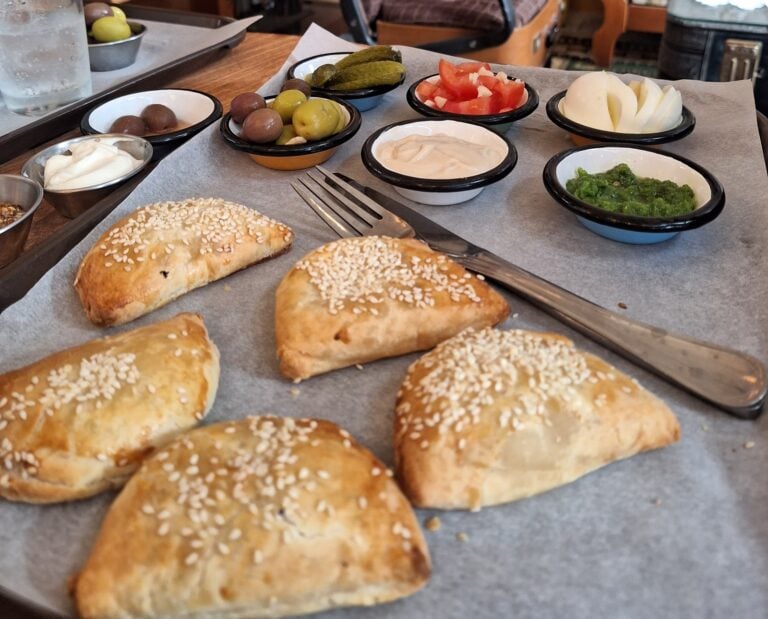
Overall, the menu is mostly about stepping back in time to when staples were deisa (semolina porridge “with heavy Soviet upbringing”); Moshe B’teva (pig in a blanket); havita (omelet) in a pita; and leben, the traditional sour yogurt updated with the addition of granola.
The classic Israeli petit-beurre fridge cake has its place on the list of desserts, alongside semolina cake.
Although an espresso lover, I can’t help but order a café morot (teachers’ coffee) the old fashioned Elite instant coffee in the red tin which had its place in every staffroom and office. It’s served with a petit beurre cookie.
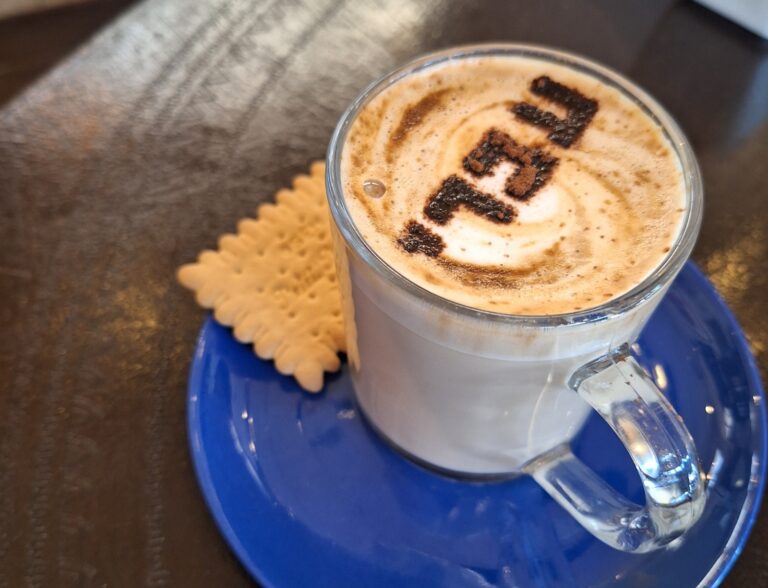
Only Hebrew music
Music is a big part of the Ivri experience, with open-mic evenings for standup, weekly jazz and other musical entertainment in the evening.
The walls are covered with music memorabilia including photographs of classic Israeli stars (Sasha Argov, Ofra Haza, Arik Einstein) and old vinyl records, some autographed, which were donated by Dalia Lahav, a famous Israeli actress in the 1970s who happens to be Levy’s aunt.
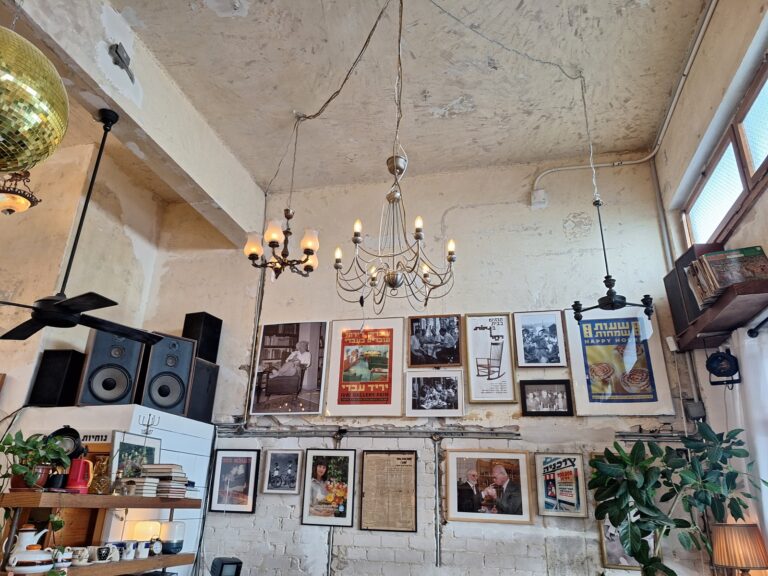
In the future, Levy hopes to develop the Shuk Ivri concept where all items in the store will be for sale.
I have my eye on a photograph of David Ben-Gurion curled up on an armchair wearing socks and another of Golda Meir washing dishes in her kitchen.
Be nostalgic and happy
Levy recognizes the recent surge in sentimentality in Israel (such as mostly playing Hebrew music on the radio, including golden oldies) since the tragic events of October 7.
He says it’s a natural way of uplifting ourselves, as nostalgia by definition is a very positive feeling and a happy reminder of things past.
“It can’t be negative and this is what I wanted to create for people as soon as they walk in. I always say that despite being in difficult times I hope at Ivri I can make you remember better times,” Levy says with a warm smile.
The shop is located on 8 Gedud HaIvri Street in Tel Aviv and is open Monday through Thursday 9am to 6pm; Friday until 4:30pm; and Saturday from 10 to 5:30.
For more information, click here.




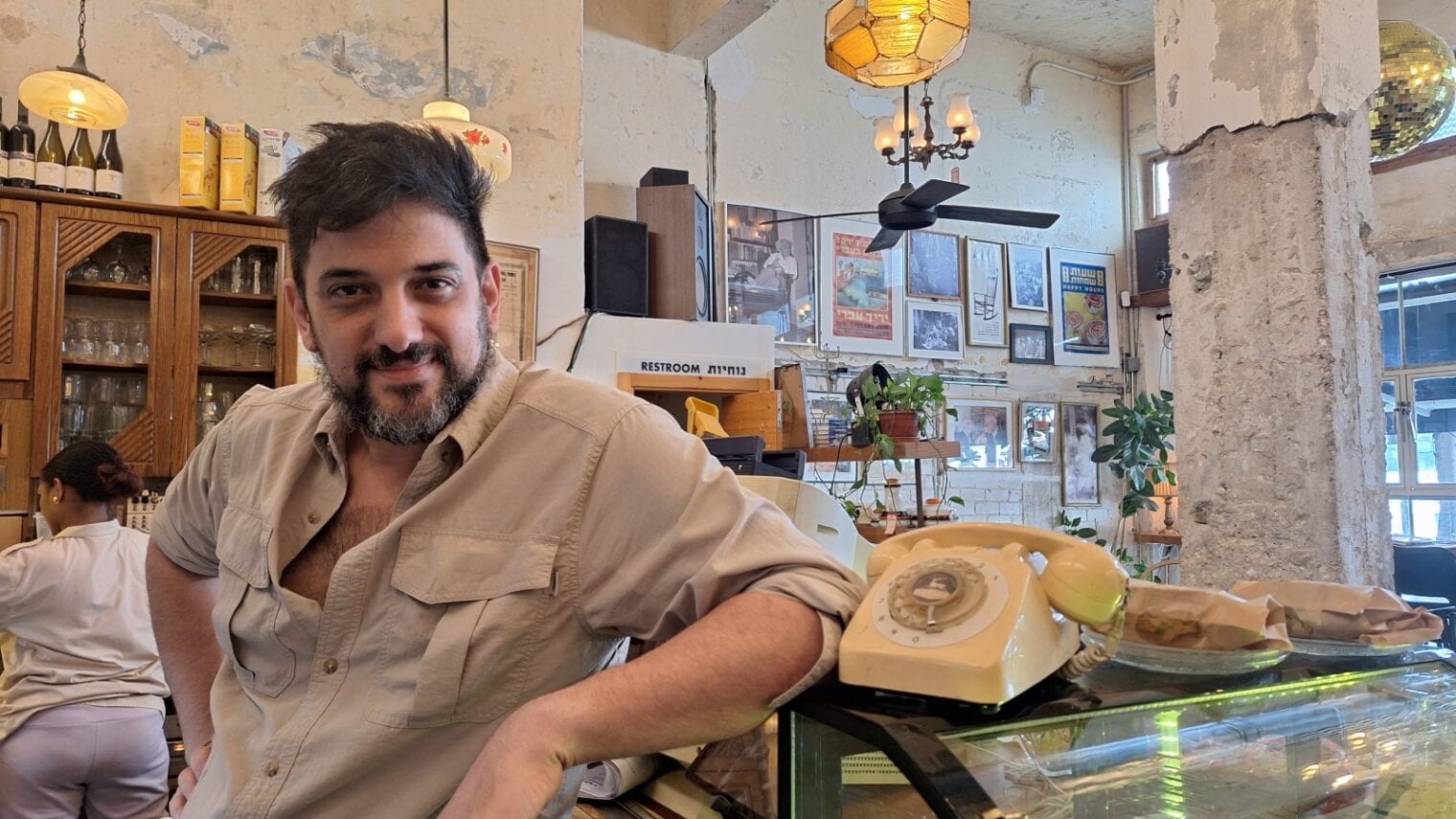








![Elections 1977 – Likud posters] In 1977, Menahem Begin led an election upset as Israel’s first non-Labor prime minister. Credit: GPO Elections 1977 – Likud posters] In 1977, Menahem Begin led an election upset as Israel’s first non-Labor prime minister. Credit: GPO](https://static.israel21c.org/www/uploads/2019/09/Elections_1977___Likud_posters_-_GPO-768x432.jpg)
